|
|
|
Sort Order |
|
|
|
Items / Page
|
|
|
|
|
|
|
| Srl | Item |
| 1 |
ID:
137219


|
|
|
|
|
| Summary/Abstract |
Secessionist movements are often motivated by a sense of exclusion, abuse, and assimilation at the hands of host states. But in waging armed struggles and constructing ethnic nationalisms, they may replicate such grievances against their own minorities. This paper seeks to provide a deeper understanding of how ‘second-order minorities’ respond to secessionist ethno-nationalism. Based on ethnographic research in Aceh, Indonesia, this paper looks to how Javanese, Malay, Alas, and Gayo communities responded to Acehnese secessionism. Aceh’s minorities did not support Aceh’s rebels, opting to flee or resist rebellion. In explaining their reaction, I suggest that the same ethno-nationalist project which united many Acehnese in the secessionist struggle served to repel non-Acehnese communities, leading to ethno-nationalist revivals among Aceh’s minorities and continued tensions in the post-conflict era.
|
|
|
|
|
|
|
|
|
|
|
|
|
|
|
|
| 2 |
ID:
090416
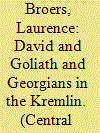

|
|
|
|
|
| Publication |
2009.
|
| Summary/Abstract |
This article presents a post-colonial perspective on post-Soviet conflict in Georgia. Patterns of group classification and incorporation in the tsarist and Soviet eras are charted, to argue that Soviet Georgia was incorporated as a series of layered peripheries, differentiated not only by ethnic affiliation with titular groups, but also by the mode of incorporation into the wider political unit of which they formed part. This produced contrasting articulations of the link between language, identity and power among Georgians, Abkhazians and Ossetians, mediating conflicting reactions to the prospect of post-Soviet devolution. Finally, the nature of the post-Soviet sovereignty attained by Georgia, Abkhazia and South Ossetia is considered.
|
|
|
|
|
|
|
|
|
|
|
|
|
|
|
|
| 3 |
ID:
073979
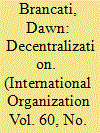

|
|
|
|
|
| Publication |
2006.
|
| Summary/Abstract |
Political decentralization is widely believed to reduce ethnic conflict and secessionism in the world today. Yet decentralization is more successful in reducing conflict and secessionism in some countries than in others. In this article, I explore why this difference occurs. I demonstrate using a statistical analysis of thirty democracies from 1985 to 2000 that decentralization may decrease ethnic conflict and secessionism directly by bringing the government closer to the people and increasing opportunities to participate in government, but that decentralization increases ethnic conflict and secessionism indirectly by encouraging the growth of regional parties. Regional parties increase ethnic conflict and secessionism by reinforcing ethnic and regional identities, producing legislation that favors certain groups over others, and mobilizing groups to engage in ethnic conflict and secessionism.
|
|
|
|
|
|
|
|
|
|
|
|
|
|
|
|
| 4 |
ID:
106846
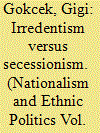

|
|
|
|
|
| Publication |
2011.
|
| Summary/Abstract |
Conventional wisdom suggests that irredentist causes, advanced by sovereign states whose politically dominant ethnic groups have access to large-scale armies, are more likely to lead to international conflict than secessionist ones, which are fought by underprivileged minorities lacking adequate military resources. This article challenges this general assumption in the literature by arguing that irredentist causes initiated by underprivileged minorities are unlikely to lead to war; likewise, secessionist causes supported by resource rich states are just as likely to escalate to international conflict. This argument is supported with evidence from the Basque and Kurdish conflicts.
|
|
|
|
|
|
|
|
|
|
|
|
|
|
|
|
| 5 |
ID:
130930


|
|
|
|
|
| Publication |
2014.
|
| Summary/Abstract |
We argue that system-level international changes have made secessionism more attractive since 1945, and that this is one of the reasons for the recent Proliferation of Aspiring States. Using original data on secessionist movements between 1816 and 2011, we document that secessionism became significantly more common after 1945. Whereas much of the existing literature explains secessionism by pointing to local or unit-level factors, we contend that security, economic, and normative changes at the international level have effectively increased the benefits of independence, without a commensurate increase in the costs. We use interviews with representatives of new states, secessionist groups, and international organizations to provide empirical support for these claims. We conclude by considering three extensions of our argument: (i) Does the nature of the changing international environment affect the way in which secessionists attempt to achieve their goals? (ii) What future changes might amplify or depress this trend? (iii) Who are the specific people benefiting from statehood, and can their position within a would-be state help us understand the nature of secessionism today?
|
|
|
|
|
|
|
|
|
|
|
|
|
|
|
|
| 6 |
ID:
151161
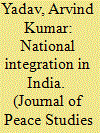

|
|
|
| 7 |
ID:
074559


|
|
|
|
|
| Publication |
2006.
|
| Summary/Abstract |
Do ethnic federations undergoing democratization promote or discourage regional secessionism? This article argues, based on evidence from the Russian Federation, that when democratization produces a transfer of political accountability from center to region, the incentives of regional leaders shift, forcing them to react to local constituencies in order to retain office. If these constituencies desire autonomy, regional leaders must respond, making separatism not merely an opportunistic strategy but a necessary one for their own political survival. Democratization, then, can transform administrative regions into electoral arenas.
However, the case of Russia also demonstrates that regional demands for autonomy are not inevitable and may dissipate after they have begun. Popular support for nationalism and separatism varied significantly among Russia's sixteen ethnic republics in the late Soviet and early post-Soviet period. This variation is explained by showing that mass nationalism, contrary to conventional wisdom, is neither a latent attribute of federal regions, nor a simple function of natural resource endowments, nor something summoned into existence by the manipulations of regional leaders. Rather, it is argued that increasing competition for jobs in the Soviet Union's failing economy allowed particular issues articulated by nationalist leaders to resonate with ethnic populations. Through the framing of issues of ethnic economic inequality, nationalist leaders were able to politicize ethnicity by persuading people to view their personal life chances as dependent on the political fate of their ethnic community. Thus, secession in democratizing ethnic federations can be best understood by directing attention toward the origins of popular support for nationalism and the role that support plays in the elite contest for power within subfederal regions.
|
|
|
|
|
|
|
|
|
|
|
|
|
|
|
|
| 8 |
ID:
137217
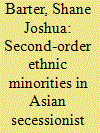

|
|
|
|
|
| Summary/Abstract |
This article provides some conceptual foundations for a special issue of Asian Ethnicity concerned with what we call ‘second-order minorities’. If secessionist conflicts involve minorities resisting abusive, assimilationist states, leading rebel groups to embark on their own nation-building efforts, how does this affect the minorities of aspiring secessionist nations? How do the minorities of secessionist groups respond to secessionism? Despite many insightful studies of secessionism and rebel ethno-nationalism, scholars have yet to explore the ways that local minorities navigate secessionist conflicts. We suggest that the relationship between secessionists and second-order minorities depends on three key factors: whether minorities are territorially concentrated or dispersed, indigenous or migrant, and nation majorities or small national minorities. These characteristics provide us some idea of the types of violence and counter-mobilization we might see among second-order minorities faced with secessionist violence. This article then previews the subsequent studies of Xinjiang, Aceh, Mindanao, and Sri Lanka, cases which capture some of the core challenges faced by second-order minorities against twin violent nation-building efforts from state and rebel forces.
|
|
|
|
|
|
|
|
|
|
|
|
|
|
|
|
| 9 |
ID:
093244


|
|
|
|
|
| Publication |
2009.
|
| Summary/Abstract |
Yemen is increasingly caricatured as a failed state. Such analysis obscures a more complex picture that includes prevailing dynamics of secessionism, resource poverty, demographic change and ethno-sectarianism. Alistair Harris and Michael Page argue that a narrow focus on Al-Qa'ida in the Arabian Peninsula is both analytically and practically unhelpful. Instead, addressing the broader security concerns in the region could help create a coherent sense of nationhood that will in turn challenge Al-Qa'ida's aspirations to increase its popularity and size in the country.
|
|
|
|
|
|
|
|
|
|
|
|
|
|
|
|
| 10 |
ID:
102878
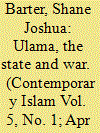

|
|
|
| 11 |
ID:
102933
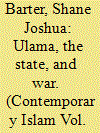

|
|
|
|
|
| Publication |
2011.
|
| Summary/Abstract |
In recent years, much has been said of the relationship between the headmasters of Islamic boarding schools (ulama), the state, and war. Hoping to clarify how ulama behave in times of war and why they react as they do, I look to the recent secessionist conflict in Aceh, Indonesia. Based on extensive village fieldwork, I find that in response to the conflict, Aceh's ulama were divided; some supported the rebels, some supported the state, and some remained neutral. These positions were largely predicted by combatant control, a pragmatic response to conflict dynamics. Sub-regional comparisons, temporal comparisons, and interviews suggest that while many ulama sided with power, they also sided against human rights abuses, a concern for social justice which may be rooted in religious sentiment after all.
|
|
|
|
|
|
|
|
|
|
|
|
|
|
|
|
| 12 |
ID:
157897


|
|
|
|
|
| Summary/Abstract |
Conflicting theories and mixed empirical results exist on the relationship between ethnic diversity and trust. This article argues that these mixed empirical results might be driven by contextual conditions. We conjecture that political competition could strengthen ethnic saliency and, in turn, salient ethnic identities can activate or intensify in-group trust and depress trust in members of other ethnic groups. We test this conjecture using the move toward secession in Catalonia, Spain. We conduct trust experiments across ethnic lines in Catalonia before and during the secessionist process. After three years of proindependence mobilization in Catalonia, one of the ethnic groups, Spanish speakers living in Catalonia, has indeed increased its in-group trust. This result is robust after a set of individual-level variables are controlled for, but no equivalent result is found in a comparable region, the Basque Country.
|
|
|
|
|
|
|
|
|
|
|
|
|
|
|
|
|
|
|
|
|